Coping saws
- More
information >>
Coping saws are used for cutting different
types of wood or plastic. They are very good
at cutting curved shapes in wood or plastic.
You can also use an electric jigsaw to cut
curves. Coping saws can be tricky to use you
need to keep the saw in a horizontal position
for it to cut correctly. Coping saw blades
can be easily broken if used incorrectly.
You can replace the blade by unscrewing the
handle on the saw. |
Used for cutting curved shapes in wood or
plastic. |
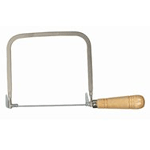 |
Try-square
- More
information >>
The wood workers try-square is used for marking
straight lines on wood. The try-square is
pushed against a straight edge of wood and
a marking knife or pencil is used to cut a
straight line across the wood. The try square
has a brass face plate which is added to its
stock. The metal section attached to the stock
or handle is called the blade. |
Used for marking out straight lines on wood. |
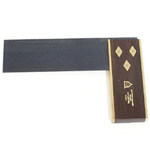 |
Tenon
saw - More
information >>
The Tenon saw is quite heavy; this weight
of the saw as well as the forward cutting
motion enables the saw to cut relatively easily.
The Tenon saw is a type of back saw this is
because it has a steel or brass back to the
saw. The tenon saw is generally used for cutting
mortise and tenon joints. The tenon saw is
good at cutting straight lines in wood.
|
Used for cutting mortise and tenon joints
and straight lines on wood.
|
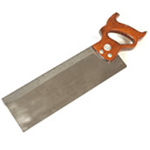 |
Chisel
- More
information >>
A chisel is used to remove wood by carving
it. A chisel has a shaped cutting end made
of metal and a wooden handle. The chisel is
pushed into the wood using a mallet to gain
force. Chisels are named by the shape of the
chisel the main types are bevel, firmer and
paring.
|
Used for carving or shaping wood. |
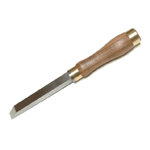 |
File
- More
information >>
Hand files are used to smooth rough or sharp
edges on material. Files can be used to smooth
metals or woods. Files are made from high
carbon steel so that they are tougher that
the material that they are filing. Hand files
are held within the hand and are pushed flat
to the surface of the material. The file is
then pushed forwards and back to smooth the
material.
|
Used to smooth rough or sharp edges from metal
or wood. |
 |
G-Clamps
- More
information >>
G-Clamps are
indispensable within the workshop for holding
and securing work. They are available in
many sizes and are used for securing work
to the surface of a bench. They are also
used to hold wood together while the glue
is drying.
|
used for securing work . |
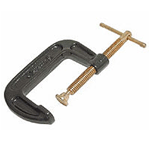 |
Steel
rule - More
information >> Steel rules are
more accurate than plastic rulers. Steel
rules measurements start at the beginning
of the rule unlike plastic rulers whose
measurements start around half a centimetre
from the beginning.
|
Used for measuring and marking out work. |
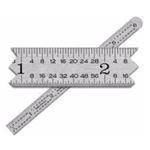 |
The
Pillar Drill - More
information >> A Pillar drill
is a fixed drill that is mounted or fixed
to a floor so it cannot be pushed over.
It can drill larger pieces of material quickly
and easily. It is made up of a base, a pillar,
a table and a drill head. The drill table
can be adjusted vertically and is moved
up and down depending on the what you are
drilling. A pillar drill can only drill
down at 90 degrees unlike a hand drill,
however it is very stable and is relatively
safe as you can clamp your work to the table.
|
Used to drill larger pieces of material quickly
and easily. |
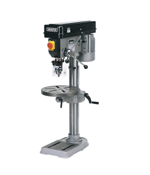 |
The
Fretsaw - More
information >> The fretsaw is
used to cut wood and plastic it can cut
curves like a coping saw. The best fretsaws
are manufactured by a company called ‘Hegner’
in Germany. A fretsaws blade vibrates up
and down to create the cutting motion. When
using a fretsaw you should always use goggles
you should also not force the material when
cutting as the blades can be easily broken.
|
Used to cut curves in material. |
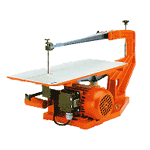 |








